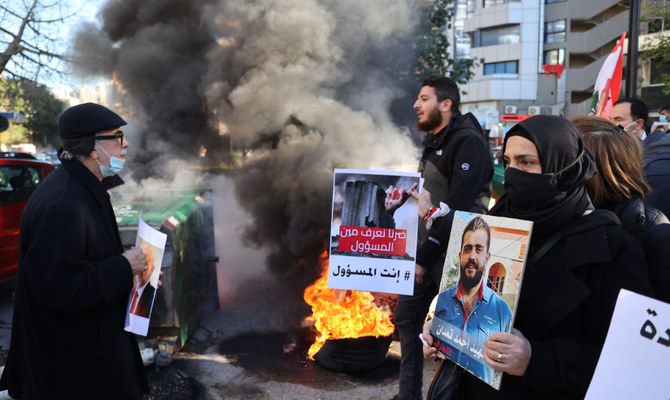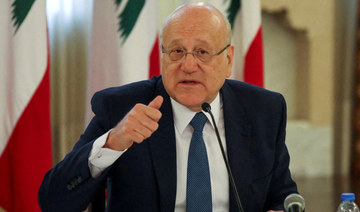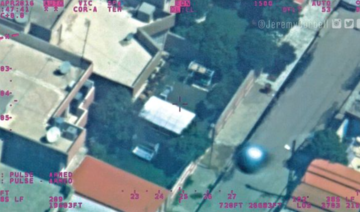BEIRUT: Relatives of the victims of the explosion that destroyed Beirut’s Port in August 2020 staged a fresh protest in the city on Monday, amid growing anger and frustration over what they see as “procrastination” that is hampering the official investigation into the blast.
They blocked roads and entrances at the Palace of Justice to express their “anger and deep sense of the injustice inflicted on them by all those who submit requests to reject the work of judicial investigator Judge Tarek Bitar.”
Their demonstration caused work in the courtrooms to grind to a halt. The families accuse authorities of “negligence, ignoring and covering up the crime and the catastrophe of the biggest explosion in modern history that afflicted Lebanon and Beirut.”
They said that they will call for an international investigation “if stagnation and threats continue, and the case is diluted.”
Bitar, 48, has been unable to complete his investigation into the explosion and the part that the actions of politicians and officials might have played in the events that led up to it. The individuals under investigation include a former prime minister, four ministers and a number of deputies, senior security officials and port officials.
The work of the judge has been suspended for more than two months. He took over the case in February last year after his predecessor, Judge Fadi Sawan, who was removed from the investigation by the Court of Cassation following complaints by two ministers accused of negligence that resulted in the deaths of innocent people.
Since taking over the case, Bitar has been subjected to a smear campaign, intense political pressure and threats inside the Palace of Justice from a Hezbollah official. Suspects in the case, including ministers and representatives, who enjoy parliamentary immunity, have filed dozens of lawsuits calling for Bitar to be removed from the case.
Hezbollah Secretary-General Hassan Nasrallah accused Bitar of “politicizing the investigation and exercising discretion.” The party’s supporters staged protests in October demanding the judge be replaced. Supporters of the Amal Movement joined the demonstrations, which escalated into violent clashes and led to deaths.
During the protests at the Palace of Justice on Monday, families of the victims of the port explosion called on officials to make the necessary judicial appointments to ensure requirements are met for the number of members of the general assembly of the Court of Cassation. The court recently lost its quorum when one of its judges retired, which has hampered efforts to resume the investigation.
A delegation representing the protesters reached the office of Judge Suhail Abboud, the president of the Supreme Judicial Council. Members of the delegation said that when asked about restoring the quorum, Abboud told them “any legal measures that can be taken to protect the investigation will be studied.”
The protesters carried banners denouncing the “corrupt political authority and state officials who dilute the investigation file, manipulate the law and want to remove Judge Bitar, who is entrusted by all the Lebanese to reveal the facts and punish the criminal perpetrators, from whichever side.”
Another banner read: “No one is immune when 220 are martyred, 6,500 wounded, half of the capital Beirut is destroyed and hundreds of thousands of citizens are displaced.”
In a statement, the protesters said: “Enough of wasting time, sometimes by resorting to political immunity and sometimes by accusing Judge Bitar of discretion or politicization in an attempt to remove him and end the investigation.
“Today, we affirm that we are behind the judicial investigator more than ever before and we hold the accused criminals responsible for doing nothing but obstruction and evasion of justice.”
The relatives expressed anger over the failure of authorities to act on a warrant, issued by Bitar, for the arrest of MP Ali Hassan Khalil, a former finance minister who is political assistant to the head of the Amal Movement, Nabih Berri.
They questioned “how this minister was able to hold a press conference a week ago without anyone touching him.”
A judicial source told Arab News that Judge Bitar will remain unable to resume his investigation until appointments are made to the Court of Cassation so that it can make a decision to do so, and ruled out the possibility of these appointments taking place before the presidential election in May.
























